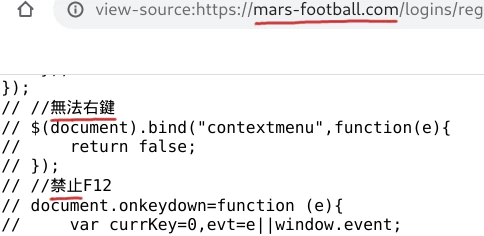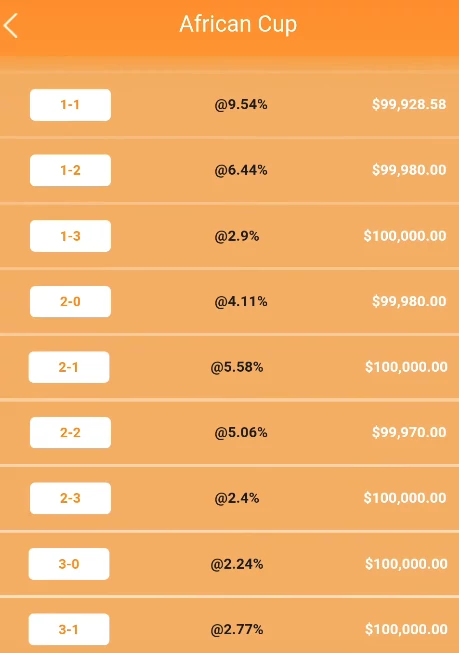Mars Football Review: Football themed “click a button” Ponzi
 Mars Football provides no information about who owns or runs the company on its website.
Mars Football provides no information about who owns or runs the company on its website.
Mars Football’s website domain (“mars-football.com”), was registered through a Singaporean registrar on June 5th, 2022.
Visiting Mars Football’s website reveals it’s just a gateway to the company’s app.
If we take a look at Mars Football’s website source-code we find Chinese used:

As always, if an MLM company is not openly upfront about who is running or owns it, think long and hard about joining and/or handing over any money.
Mars Football’s Products
Mars Football has no retailable products or services.
Affiliates are only able to market Mars Football affiliate membership itself.
Mars Football’s Compensation Plan
Mars Football affiliates invest tether (USDT), on the promise of advertised returns.
Returns offered through Mars Football are variable daily rates, paid under the ruse of sports betting.

The highest daily percentage I saw offered through Mars Football was 9.54%.
The MLM side of Mars Football pays on recruitment of affiliate investors.
Mars Football affiliates receive a percentage of invested funds, paid down three levels of recruitment (unilevel):

- level 1 (personally recruited affiliates) – 10%
- level 2 – 5%
- level 3 – 3%
Joining Mars Football
Mars Football affiliate membership is free.
Full participation in the attached income opportunity requires investment in tron.
Mars Football Conclusion
Mars Football is yet another “click a button” app Ponzi scheme.

Affiliates invest tether and are required to “click a button”. Mars Football represents clicking a button is tied to gambling on football match outcomes.

In fact all Mars Football are doing is recycling invested funds to pay returns.
Mars Football is part of a group of “click a button” app Ponzis launched over the past few months.
Thus far BehindMLM has documented:
- COTP – pretended affiliates clicking a button generated trading activity, collapsed May 2022
- EthTRX is a similar app-based Ponzi, with the daily task component disabled
- Yu Klik – pretends clicking a button generates trading activity, targeting Indonesia
- KKBT – pretended clicking a button generates crypto mining revenue, targeted South Africa and India & collapsed early June 2022
- EasyTask 888 – pretends clicking a button was tied to social media manipulation (YouTube likes), targets Colombia
- DF Finance – pretended clicking a button generated “purchase data” which was sold to ecommerce platforms, collapsed June 2022
- Shared989 – pretended clicking a button was tied to social media manipulation (YouTube likes etc.), collapsed June 2022
- 86FB – pretended clicking a button was tied to gambling on football match outcomes, collapsed April 2022
- 0W886 – pretended clicking a button was tied to gambling on football match outcomes, collapsed May 2022
- U91 – pretended clicking a button was tied to gambling on football match outcomes, collapsed May 2022
- 365Ball – pretends clicking a button is tied to gambling on football match outcomes, (has collapsed multiple already)
- YLCH Football – pretends clicking a button is tied to gambling on football match outcomes
- Parkour – pretends clicking a button is tied to social media manipulation (YouTube likes etc.)
- OTCAI – pretended affiliates clicking a button generated trading activity, collapsed May 2022
- N9 Football – pretended affiliates clicking a button was tied to gambling on football match outcomes, collapsed May 2022
- Tron.BI – pretends affiliates clicking a button was tied to TRX cloud mining
- EFG Football – pretended affiliates clicking a button was tied to gambling on football match outcomes, collapsed May 2022
- GP Football – pretended affiliates clicking a button was tied to gambling on football match outcomes, collapsed May 2022
- Lucky Football, pretended affiliates clicking a button was tied to gambling on football match outcomes, collapsed May 2022
- WT91 – pretends affiliates clicking a button is tied to gambling on football match outcomes
There are more of these scams around that I haven’t got to yet.
All the recent app-based task Ponzis appear to be launched by the same group of scammers.
Based on the use of simplified Chinese, I suspect the group are operating out of China or Singapore.

